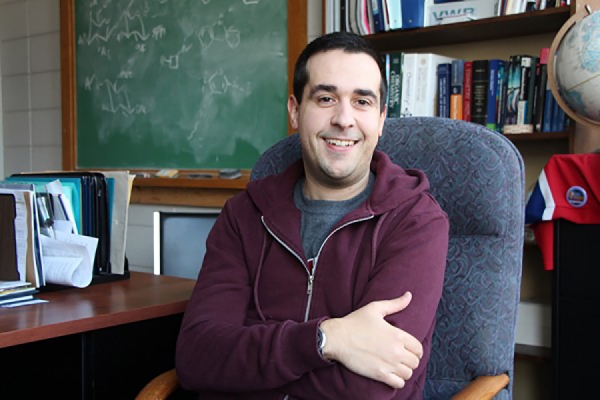 Simon Rondeau-Gagné is one of two UWindsor chemistry professors each receiving a $25,000 NSERC grant to initiate international research collaborations.
Simon Rondeau-Gagné is one of two UWindsor chemistry professors each receiving a $25,000 NSERC grant to initiate international research collaborations.
International collaborations are sparking symbiotic partnerships for two UWindsor chemistry professors.
Marcus Drover and Simon Rondeau-Gagné have each received an NSERC Alliance International Catalyst grant, carrying $25,000 in funding for one year to support Canadian researchers in initiating international research collaborations.
“This award gives us the opportunity to reach out to researchers with complimentary expertise and novel instrumentation, in order to boost our research,” says Dr. Rondeau-Gagné, associate professor of chemistry and biochemistry.
Rondeau-Gagné will collaborate with Prof. Xiaodan Gu of the University of Southern Mississippi to develop new semiconductors.
“We’re getting support from experts who complement our research using their expertise for the advanced characterization of novel materials,” says Rondeau-Gagné.
“With this grant, we will develop new chemical strategies to investigate the properties of 2D materials. Dr. Gu’s team will use specialized instruments to determine the mechanical properties of these materials, allowing us to design superior scaffolds.”
Dr. Drover, assistant professor of chemistry and biochemistry, is teaming with Prof. David Nelson at the University of Strathclyde in Glasgow to fine-tune designer molecules. Specifically, his team wants to replace the rare and precious metal, palladium, in catalytic carbon-carbon bond-formation reactions.
“We are interested in building new catalysts (compounds that speed up the rate of a reaction without being consumed) based on nickel — a greener alternative to palladium as it is more Earth-abundant and cheap,” says Drover.
As Drover’s team builds designer catalysts, Dr. Nelson will use computational methods to help design and better understand the mechanisms of said catalytic reactions.
“To oversimplify, Dr. Nelson takes the information we gain in the lab, inputs it into a computer and determines the amount of energy that a reaction or transformation needs to get going.
“From this data we can begin to understand how to design a superior catalyst without having to make everything in the lab.”
Drover says Strathclyde has high-performance computers not available to him at the University of Windsor.
“The NSERC Alliance International Program is a creative way to bring scientists from different disciplines together to solve some of our world’s most pressing issues. From this collaboration, we hope to visit Strathclyde, with him and his students also visiting us here in Windsor,” says Drover.
“This program targets problems of global importance and generates myriad benefits for Canadian researchers that extend from such international networking opportunities.”
